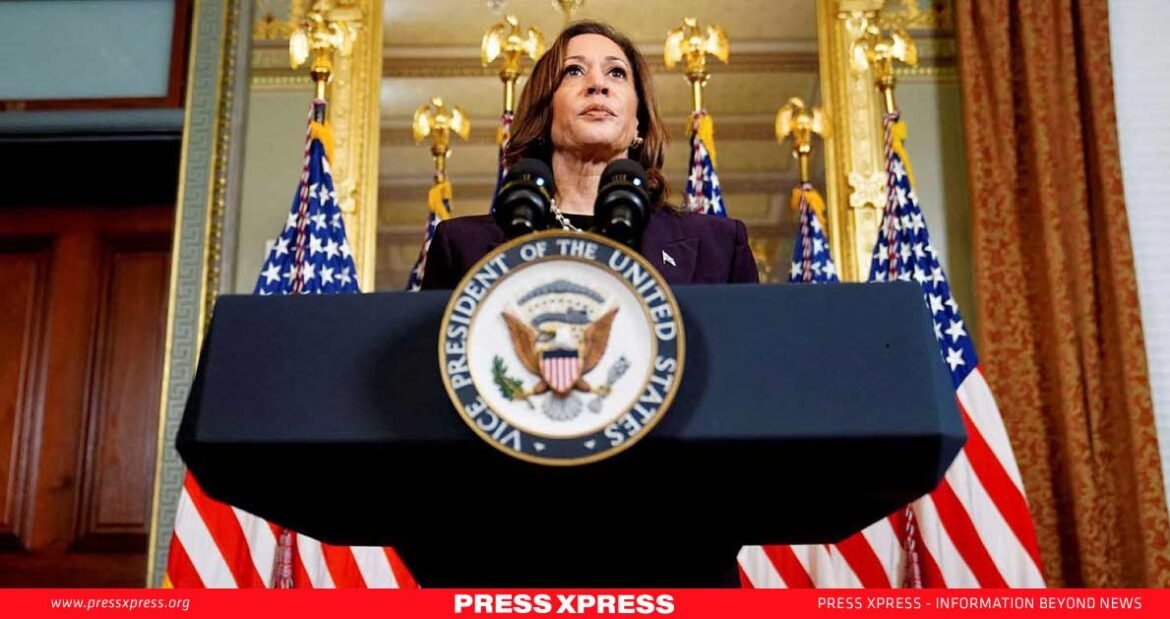Israeli Prime Minister Benjamin Netanyanu met with us President Joe Biden and vice president Kamala Harris on Thursday, July 25, following his controversial joint address to the US Congress that prompted boycotts and protests. This visit marks Netanyahu’s first trip to the White House since resuming office in late 2022.
US officials view the meeting as an opportunity to press Netanyahu on a proposed Gaza ceasefire and hostage deal, which he has yet to publicly support, including during his congressional address.
You Can Also Read: France Kicks Off Olympics 2024, Launches Record Security Effort in History
Vice President Harris, who did not attend Netanyahu’s congressional address, condemned the protests surrounding the visit, stating that ‘antisemitism, hate, and violence’ have no place in America. Harris took a firmer stance than President Biden, urging Netanyahu to help secure a Gaza ceasefire to alleviate the suffering of Palestinian civilians.
“It is time for this war to end,” Harris declared in a televised statement after her discussions with Netanyahu.
As the likely Democratic presidential nominee following Biden’s withdrawal from the election race on July 21, Harris did not shy away from addressing the severe humanitarian crisis in Gaza, which has persisted for 9 months amidst ongoing conflict between Israel and Hamas militants.
Harris to Netanyahu: ‘Time to Finalize Ceasefire Deal’
“We cannot allow ourselves to be numb to the suffering and I will not be silent,” Harris said. Her comments were notably forceful and grave, prompting speculation about a potentially tougher stance towards Prime Minister Netanyahu should she win the presidency on November 5 Ceasefire negotiations have been ongoing for months.

US officials are optimistic that an agreement is within reach. Harris stated, “The talks to secure this deal have shown promising progress, and I’ve just informed Prime Minister Benjamin Netanyahu that it’s time to finalize this agreement that was supposed to be completed earlier on June.”
While her role as vice president has generally involved echoing President Biden’s strong support for Israel’s right to self-defense, on July 25 she clearly expressed growing impatience with Israel’s military strategy.
The conflict in Gaza has drawn increasing global scrutiny, with many nations expressing concern over Israel’s military approach and its impact on civilian populations. According to Gaza’s Health Ministry, Israeli airstrikes and ground operations in the enclave have resulted in over 36,000 Palestinian fatalities. The ministry’s figures do not differentiate between combatants and non-combatants.
The current hostilities began following Hamas’ attack on southern Israel on October 7. During this incursion, militants killed approximately 1,200 people, primarily civilians, and took around 250 hostages. Israeli authorities report that about 100 captives remain in Gaza, along with the remains of roughly 30 others.
What is the Ceasefire Deal?
Phase 1 (6 weeks):
- Complete cessation of hostilities
- Israeli forces withdraw from populated Gaza areas
- Release of specific hostages (women, elderly, wounded) in exchange for Palestinian prisoners
- Return of American hostages and remains of deceased hostages
- Increased humanitarian aid (600 trucks daily to Gaza)
Phase 2:
- Release of all remaining living hostages, including male soldiers
- Complete withdrawal of Israeli forces from Gaza
Phase 3:
- Initiation of extensive Gaza reconstruction efforts to address war-induced devastation
$12.5B to Israel: The Price Tag Fueling Democratic Discord
The ongoing conflict in Gaza has caused significant divisions within the Democratic Party and led to months of demonstrations at President Biden’s events. Since the outbreak of hostilities between Israel and Hamas, the United States has passed legislation allocating substantial military aid to Israel. This includes at least $12.5 billion, with $3.8 billion approved in March 2024 and an additional $8.7 billion through a supplemental appropriations act in April 2024.

The situation has potentially serious electoral implications for the Democrats. A decline in support among Arab American voters could negatively impact the party’s prospects in Michigan, a crucial swing state for the upcoming November 5 presidential election.
Meanwhile, the Biden administration is actively working to secure the release of American hostages held in Gaza. The Vice President has personally met with the families of those captured and has publicly named the individuals currently being held by Hamas.
As the Gaza conflict approaches its 10-month mark, the risks couldn’t be higher for all involved. With Vice President Harris taking center stage in the ceasefire negotiations, a potential shift in US-Israel relations emerges on the horizon. Will Harris’s firm stance on ending the war and securing a ceasefire deal be the game-changer that brings peace to the region, or will it further complicate the delicate balance of power in the Middle East? Only time will tell, but one thing is certain – the road to resolution is paved with tough decisions and even tougher conversations.


